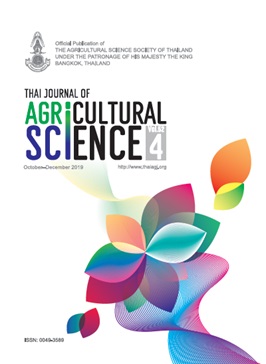Assessment of some Physiological and Biochemical Parameters of Three Thai Sugarcane Cultivars under Salt- and Drought-stress
Main Article Content
Abstract
Lack of tolerance to drought and salt are major problems in growing sugarcane in Thailand. For testing these physiological stress conditions, we compared the Thai cultivars KPS 01–01–25, KPS 01–01–12 and LK92–11 genotypes in assays with different levels of sodium chloride (0–2% NaCl) and polyethylene glycol (0–15% PEG–6000) for a period of 4 weeks. We observed that both the salt and PEG treatments significantly increased the proline and glycine betaine contents in the leaves. The compound solutes accumulation can indicate osmotic adjustment in sugarcane, whereas the chlorophyll stability index and water relation content decreased significantly in treatments with salt treatments of 2% NaCl. In addition, membrane damage rates responded to only high concentrations of PEG. The results suggested that sugarcane responds differently regarding organic osmolytes accumulation and its physiological mechanisms in response to NaCl and PEG stress. Our studies allowed us to define the sugarcane KPS 01–01–25 as moderately tolerant to salt and drought stress compared to that of sugarcane PS 01–01–12 (tolerant) and LK92–11 (susceptible).


